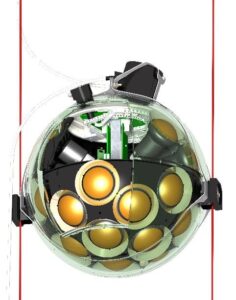27 July 2022 – Long-term operation in the deep sea puts challenging requirements on detectors. A review of the design and construction of the KM3NeT optical module has been published:
S. Aiello et al. 2022 JINST 17 P07038 DOI 10.1088/1748-0221/17/07/P07038
Abstract:
The optical module of the KM3NeT neutrino telescope is an innovative multi-faceted large area photodetection module. It contains 31 three-inch photomultiplier tubes in a single 0.44 m diameter pressure-resistant glass sphere. The module is a sensory device also comprising calibration instruments and electronics for power, readout and data acquisition. It is capped with a breakout-box with electronics for connection to an electro-optical cable for power and long-distance communication to the onshore control station. The design of the module was qualified for the first time in the deep sea in 2013. Since then, the technology has been further improved to meet requirements of scalability, cost-effectiveness and high reliability. The module features a sub-nanosecond timing accuracy and a dynamic range allowing the measurement of a single photon up to a cascade of thousands of photons, suited for the measurement of the Cherenkov radiation induced in water by secondary particles from interactions of neutrinos with energies in the range of GeV to PeV. A distributed production model has been implemented for the delivery of more than 6000 modules in the coming few years with an average production rate of more than 100 modules per month. In this paper a review is presented of the design of the multi-PMT KM3NeT optical module with a proven effective background suppression and signal recognition and sensitivity to the incoming direction of photons.


